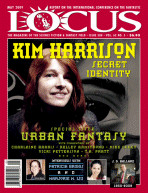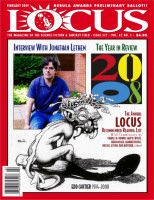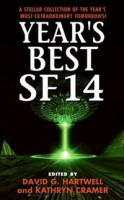It seems that some fans disgruntled over the fact that podcasts can compete in fanzine or semiprozine have submitted their own proposal for modifications to the semiprozine and fanzine categories to kick them out. The semiprozine committee saw this proposal before completing theirs and specifically chose not to include it.
Even if you don’t think podcasts should compete in either category, the hatchet job done to the rules for semiprozine SHOULD concern you. This is their definition, redlining things they have deleted:
3.3.12: Best Semiprozine. Any generally available
non-professionalperiodical publication devoted to science fiction or fantasy which by the close of the previous calendar year has published four (4) or more issues(or the equivalent in other media), at least one (1) of which appeared in the previous calendar year, and which in the previous calendar year met at leasttwo (2)one (1) of the following criteria:
(1) had an average press run of at least one thousand (1000) copies per issue,
(2) paid its contributors and/or staff in other than copies of the publication,
(3)(2) provided at least half the income of any one person,
(4)(3) had at least fifteen percent (15%) of its total space occupied by advertising,
(5)(4) announced itself to be a semiprozine.
Audio and video productions are excluded from this category.
The impact of this change would be to put EVERY magazine that isn’t a fanzine (or anything that doesn’t have “issues”, goodbye Daily Science Fiction?) INTO THE SEMIPROZINE CATEGORY. Yes, Asimov’s, Analog, F&SF… ALL of them would be eligible in the semiprozine category. Just ridiculous.
Don’t let them throw semiprozines under the bus to maintain “print purity” in the fanzine and semiprozine categories! Go to the business meetings this THURSDAY and FRIDAY morning at Worldcon and make yourself heard. More details to follow.
 Established: 1968
Established: 1968 The Locus Magazine Recommended Reading list is published annually in their February issue and represents a consensus view by Locus editors and reviewers.
The Locus Magazine Recommended Reading list is published annually in their February issue and represents a consensus view by Locus editors and reviewers. The table of contents for David G. Hartwell and Kathryn Cramer’s
The table of contents for David G. Hartwell and Kathryn Cramer’s